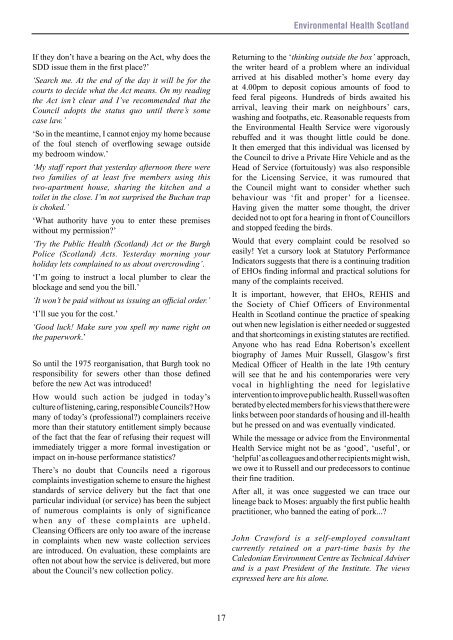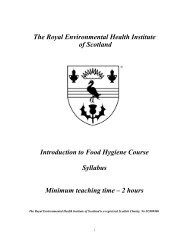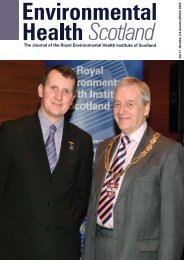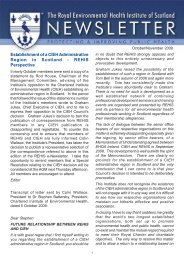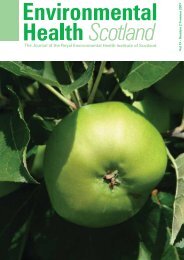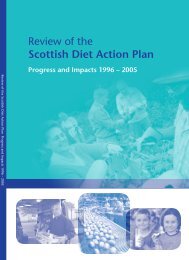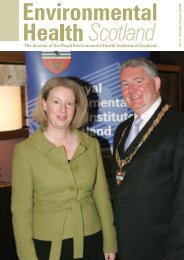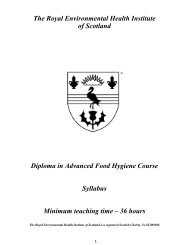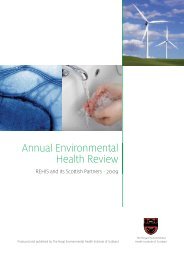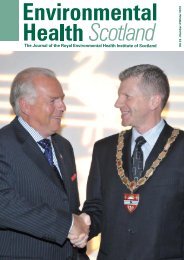Download REHIS Journal 20/2 (Summer 2008) - The Royal ...
Download REHIS Journal 20/2 (Summer 2008) - The Royal ...
Download REHIS Journal 20/2 (Summer 2008) - The Royal ...
Create successful ePaper yourself
Turn your PDF publications into a flip-book with our unique Google optimized e-Paper software.
Environmental Health ScotlandIf they don’t have a bearing on the Act, why does theSDD issue them in the first place?’‘Search me. At the end of the day it will be for thecourts to decide what the Act means. On my readingthe Act isn’t clear and I’ve recommended that theCouncil adopts the status quo until there’s somecase law.’‘So in the meantime, I cannot enjoy my home becauseof the foul stench of overflowing sewage outsidemy bedroom window.’‘My staff report that yesterday afternoon there weretwo families of at least five members using thistwo-apartment house, sharing the kitchen and atoilet in the close. I’m not surprised the Buchan trapis choked.’‘What authority have you to enter these premiseswithout my permission?’‘Try the Public Health (Scotland) Act or the BurghPolice (Scotland) Acts. Yesterday morning yourholiday lets complained to us about overcrowding’.‘I’m going to instruct a local plumber to clear theblockage and send you the bill.’‘It won’t be paid without us issuing an official order.’‘I’ll sue you for the cost.’‘Good luck! Make sure you spell my name right onthe paperwork.’So until the 1975 reorganisation, that Burgh took noresponsibility for sewers other than those definedbefore the new Act was introduced!How would such action be judged in today’sculture of listening, caring, responsible Councils? Howmany of today’s (professional?) complainers receivemore than their statutory entitlement simply becauseof the fact that the fear of refusing their request willimmediately trigger a more formal investigation orimpact on in-house performance statistics?<strong>The</strong>re’s no doubt that Councils need a rigorouscomplaints investigation scheme to ensure the higheststandards of service delivery but the fact that oneparticular individual (or service) has been the subjectof numerous complaints is only of significancewhen any of these complaints are upheld.Cleansing Officers are only too aware of the increasein complaints when new waste collection servicesare introduced. On evaluation, these complaints areoften not about how the service is delivered, but moreabout the Council’s new collection policy.Returning to the ‘thinking outside the box’ approach,the writer heard of a problem where an individualarrived at his disabled mother’s home every dayat 4.00pm to deposit copious amounts of food tofeed feral pigeons. Hundreds of birds awaited hisarrival, leaving their mark on neighbours’ cars,washing and footpaths, etc. Reasonable requests fromthe Environmental Health Service were vigorouslyrebuffed and it was thought little could be done.It then emerged that this individual was licensed bythe Council to drive a Private Hire Vehicle and as theHead of Service (fortuitously) was also responsiblefor the Licensing Service, it was rumoured thatthe Council might want to consider whether suchbehaviour was ‘fit and proper’ for a licensee.Having given the matter some thought, the driverdecided not to opt for a hearing in front of Councillorsand stopped feeding the birds.Would that every complaint could be resolved soeasily! Yet a cursory look at Statutory PerformanceIndicators suggests that there is a continuing traditionof EHOs finding informal and practical solutions formany of the complaints received.It is important, however, that EHOs, <strong>REHIS</strong> andthe Society of Chief Officers of EnvironmentalHealth in Scotland continue the practice of speakingout when new legislation is either needed or suggestedand that shortcomings in existing statutes are rectified.Anyone who has read Edna Robertson’s excellentbiography of James Muir Russell, Glasgow’s firstMedical Officer of Health in the late 19th centurywill see that he and his contemporaries were veryvocal in highlighting the need for legislativeintervention to improve public health. Russell was oftenberated by elected members for his views that there werelinks between poor standards of housing and ill-healthbut he pressed on and was eventually vindicated.While the message or advice from the EnvironmentalHealth Service might not be as ‘good’, ‘useful’, or‘helpful’ as colleagues and other recipients might wish,we owe it to Russell and our predecessors to continuetheir fine tradition.After all, it was once suggested we can trace ourlineage back to Moses: arguably the first public healthpractitioner, who banned the eating of pork...?John Crawford is a self-employed consultantcurrently retained on a part-time basis by theCaledonian Environment Centre as Technical Adviserand is a past President of the Institute. <strong>The</strong> viewsexpressed here are his alone.17


